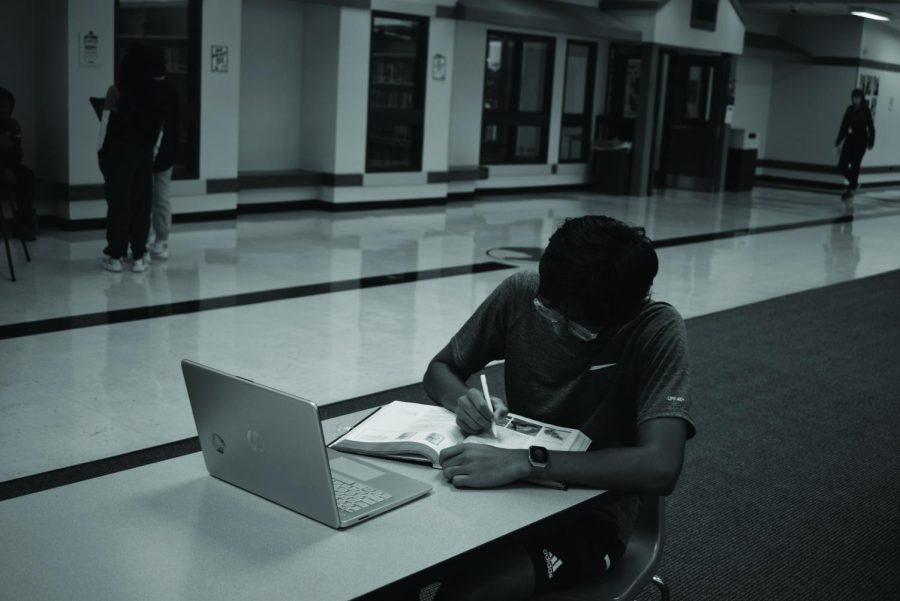Sophomore Suggestions
10 tips to survive high school from a former freshman
Sophomore Charan Ramidi highlights the most important points in his chemistry textbook. Photo by Landon Chen.
October 19, 2022
Freshman year can be tough for a lot of people. Adjusting to a new environment with new people, harder classes and less time can be extremely exhausting and hard to bear. Here are 10 tips I found from my freshman year:
1. Set up for success- (stay healthy)
Before tackling high school, it is vital to set the brain up for success. Without proper food and sleep, the brain and body will not be able to function properly. I learned this the hard way. Last year, four hours of sleep, nothing for breakfast, little to nothing for lunch (*thanks PCH cafeteria food*), and dinner became a routine. In hindsight, this was not healthy for me and had negative ramifications on my focus in lectures and performance during basketball season. All in all, to function at an optimal level, make sure to eat a proper three meals and at least get seven hours of sleep each night.
2. Set Boundaries
Remember everybody is at different levels, whether it’s seven AP classes or all regular courses. Take classes that are both manageable and challenging. For extracurriculars, just choose a couple: more clubs means less time for yourself. Last year, I made the terrible, atrocious decision to take Honors Geometry. Was math my worst subject? Yes. Did I still take it both semesters? Yes. Remember, take classes that are enjoyable but also challenging. High school is supposed to be a fulfilling and challenging time, but not a time for constant stress and mental implosion. For clubs, pick the best ones that accurately represent passions and interests, because colleges can see right through doing something “just to do it.” For me, taking three honors was the perfect balance. For others it may differ, the point is to find balance and know limits.
3. Do things to enjoy them, not for the
college resume
Basketball player, theater kid, and all-honors level student – these are all things I thought I would be. These are things I thought would look great on a college application. The problem was that I did not enjoy these things. Not only did these activities take up a great deal of time, which led to less time to study and focus on school, it lead to a great deal of sadness and inner confusion. Doing these activities made my life feel meaningless and not worth living. Having no intrinsic motivation also affected my performance in school and in these activities, which defeated the whole purpose of doing them in the first place. High school is a time for exploration. Set flexible goals and revisit them as time goes on, do things that inspire passion and happiness. Being fluid and choosing to do things to enjoy will likely result in better mental health and results as well.
4. Study Smart
I don’t wanna state the obvious, but study smart. For honors and higher level classes, make sure to have the base knowledge down pat first, and then start trying to apply that knowledge to harder problems. For taking notes, summarize every 4-5 sentences and only write down the most important points. Some of my favorite study methods are taking practice tests, writing mind maps, and Quizlet – which is now my best friend. A big mistake freshman year that I made was I did not know how to study. I would do some of the big study no-nos that would lead to poor results and more stress. SOME STUDYING RED FLAGS INCLUDE… just rereading notes, listening to heavy lyrical music, cram studying the night before, never really asking teachers for help on concepts that I did not understand. I know this seems obvious, but do not do any of these things. Study at a deeper level than just rereading notes. Music is fine, but listen to classical music or stuff with no lyrics. Spaced repetition is key, and most importantly ASK TEACHERS FOR HELP; THEY’RE THERE TO HELP STUDENTS.
5. Some non-obvious time management skills
Don’t feel like it’s necessary to attack homework right after getting home. Take a break or eat a snack. Do something enjoyable for 10-20 minutes before starting on that essay, book reading, or set of problems.
Once you do begin, start with the harder assignments first because the brain will get progressively more tired as work piles up. If there’s a day in which time is plentiful, make sure to get as much homework done as possible as this will open up relaxation in the upcoming days. Last year I would get hours of math, labs from bio, pages from English, and more assignments from history; did I do them right away? No, I would procrastinate every way I knew how. From the endless rabbit hole that is YouTube, to cleaning my room, and playing with my dog .
Also, find a homework and assignment tracking system that will work. It differs from person to person, but I prefer My study life, which is an online website that will help keep track of due dates.
6. Have a self-soothing technique
When feeling overwhelmed, have a technique or method to calm down. This can be drawing, reading, or listening to music. For me, it’s watching my favorite TV show “Survivor” — the perfect mix of competition, drama and survival. Survivor has provided me a necessary escape from reality. However, whatever this technique is, make sure to not get too drawn into it (*cough cough TikTok*). Having a self-soothing technique helped me get into the zone before attacking homework, calmed me down after failing my Honors Geometry trigonometry test (shout out to Mr. Wilson!) and overall helped me stay cool and calm throughout the second semester.
7. Speak Up
Don’t be afraid to speak about mental health to counselors, friends, teachers, or parents. Indubitably, freshman year has its roadblocks, from writing the Romeo and Juliet essay in four hours while having the flu (sorry Mrs. Rudolph), to changing/adapting to new people and friends, to that gosh darn Silvanna Sin Lanna episode that is missing, remember that stress or loneliness are bound to happen. Trust me, people won’t judge and nine times out of 10 they will support. Talking about feelings is hard, and it is even harder to talk to those closest. Overall, talking about mental health with counselors, friends, teachers, or parents won’t get rid of the pain or sadness right away, but it will ease it. When I started opening up to my friends, school became somewhat better and it made me feel at ease that I had people in my life that supported me.
8. Remove negative influences
Negative influences can come in all shapes and sizes. From media to people, negative influences can make a day go from bad to worse. It can make mental health deteriorate and cause unhealthy emotions. It is important to remove these negative influences right away and here are some warning signs of some People who are cocky and have no humility whatsoever; “the one-upper” who belittles and always feels like they have to be better than others; people that are constantly flexing their accomplishments; people that do things simply to annoy others; people who partake in bad decision making such as drugs and alcohol; environments with bad/toxic people; anything that cause excessive negative emotions, and anything that influences poor actions/cause poor results
9. Befriend upperclassmen
Movies and TV shows portray upperclassmen as mean, rude, and snobby, however at PCH (though some of these are true), for the most part, upperclassmen are super cool. One of my best friends last year was a kid a year above me named Nathan Arst. Nathan was super helpful, giving me personal anecdotes about his time in high school, which was extremely beneficial on how to attack classes and how to study. He was also someone I could talk to at any time, someone who could give me rides, and was just a very amazing friend to have. Overall, upperclassmen are very cool and can be befriended in many different ways such as sports, mutual friends, clubs and mutual classes such as Nathan and I. These connections can help with dealing with certain classes, life advice and free rides when parents cannot provide one.
10. YOLO- (in the right circumstances)
Unless taking a 5th year or becoming a teacher, high school only happens once in life, so enjoy it. Right now, there are no taxes to be paid, no family to feed, and no debts to pay. These years are crucial and are the last stepping stone into the dark dark world of adulting.
So, what am I trying to say? Have fun, embrace the struggle, connect and mess around with friends. Did I remember every paper I typed, every lab I did, or every problem I solved last year? No. I did remember long FaceTimes with friends, messing around in Ac Lab and sleepovers.
Disclaimer: I am not saying as young people we do not face problems or hardships, and I am not saying to be mindless, not care about school and get in trouble. The point I am trying to make is that high school is a small portion of life: make sure to spend time with those you love doing things you love.



